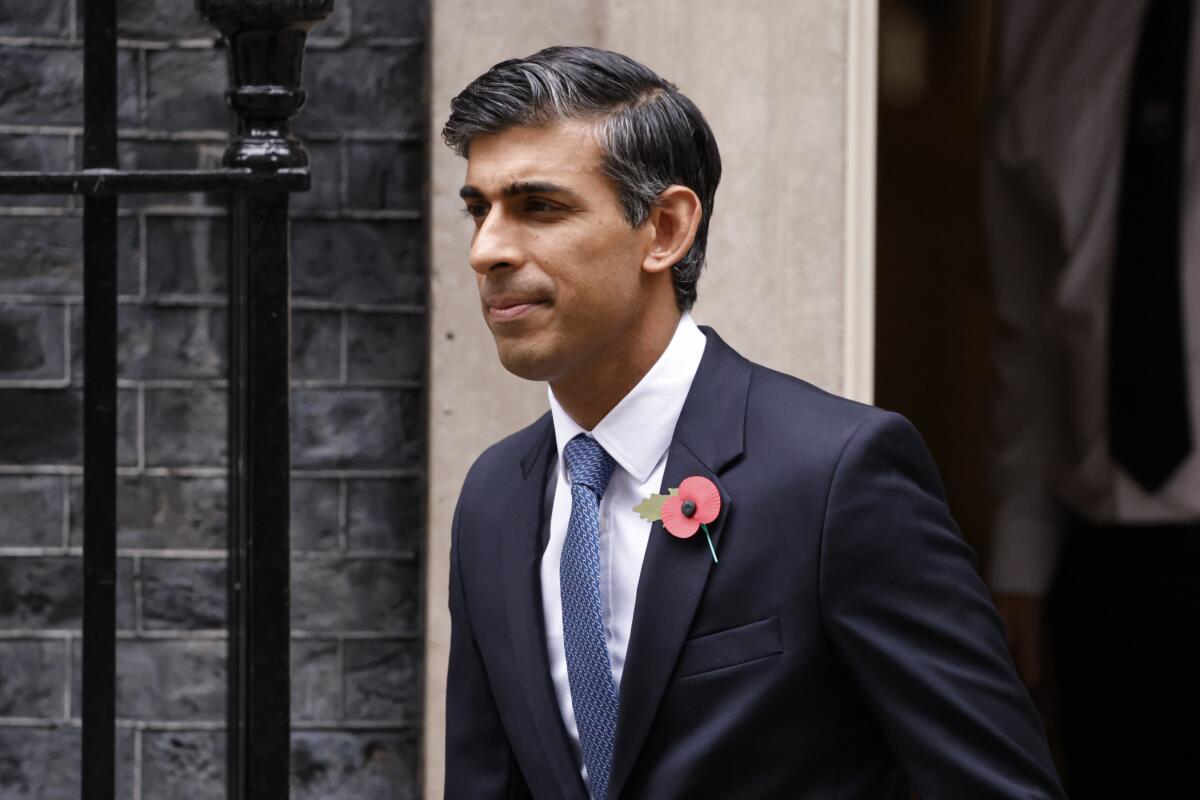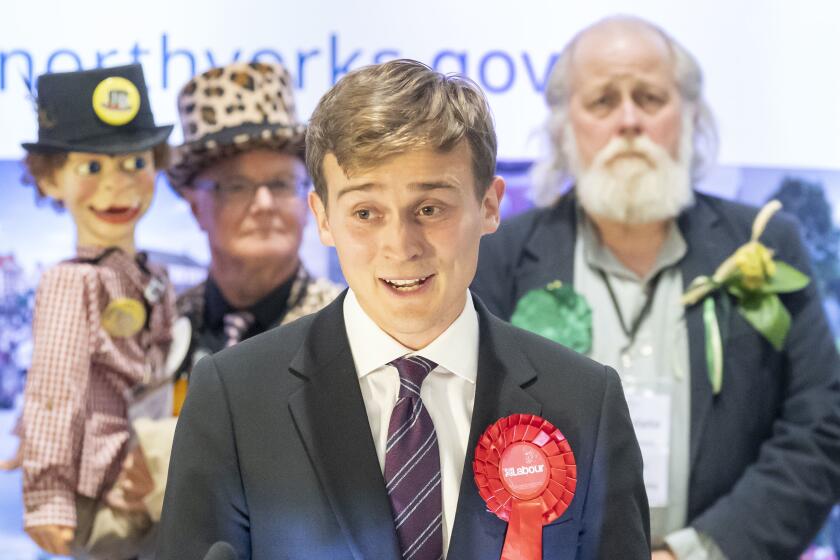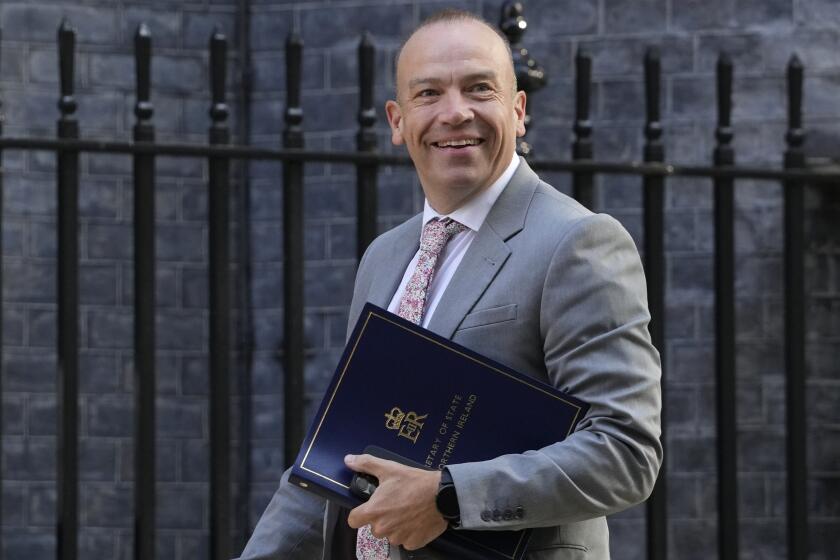British prime minister proposes a decades-long scheme to gradually ban all cigarette sales

- Share via
LONDON — For many under-18s in Britain, it’s a rite of passage: loitering outside the corner store, mustering the pluck to try to buy a package of cigarettes without their underage status being detected.
But under a proposal this week by Prime Minister Rishi Sunak, those now 14 or younger would never be allowed to smoke legally. In an echo of a law enacted in New Zealand in December, England would increase the legal smoking age, currently 18, by one year, every year, beginning in 2027.
The announcement of one of the most stringent policies on tobacco globally was made to great fanfare by Sunak, who used his speech at the Conservative Party Conference — arguably the most important prime ministerial vehicle on the British political calendar — to unveil his plans. Although Brits have broadly expressed support for the idea, with a September poll finding that 71% of citizens favor cigarettes being phased out, it has proved a surprising twist for the Conservatives, who had made little mention of the subject before Wednesday.
The proposal would cover England only — not the rest of the the U.K. — and would not include e-cigarettes, which are used by twice as many British youngsters as those who use tobacco cigarettes. Last month, the Conservative Party accepted a $427,000 donation from Supreme 8 Ltd., whose director is chief executive of a vape importer.

England’s ruling party has long made known its distaste for what some deride as a “nanny state,” one where behavior is governed by legislation rather than personal choice. As such, the move is unpopular with many leading Conservatives, including Liz Truss, who at the time of the last party conference was midway through her 49-day prime ministerial tenure. She says she’ll vote against the bill when it reaches the House of Commons.
Some suggest the announcement was a convenient distraction for Conservatives trailing in the polls. The unexpected proposal came in the same speech during which Sunak said that a planned high-speed rail network that has already cost $122 billion to build was being partly abandoned.
Britain’s ruling Conservative Party suffers thumping losses in two special elections and narrowly avoids a third in Boris Johnson’s former district.
The biggest surprise is that England might wind up following in New Zealand’s legislative wake. Though the Conservative government was highly critical of former New Zealand Prime Minister Jacinda Ardern (under whom the world’s first smoking phaseout was passed), Wednesday’s announcement appeared to signal a turning tide.
Dr. Ayesha Verrall, New Zealand’s health minister, says she is “delighted that other countries are following suit” and remains “incredibly proud of the bold, historic step” the nation took last year. More than 56,000 people have stopped smoking since 2022, she says, a downward trend that means “only 8% of the adult New Zealand population is smoking daily.” Cigarettes, Verrall says, are “a sunset industry in New Zealand and around the world.”
New Zealand, one-thirteenth the size of the U.K., hopes to be virtually smoke-free, with 5% or less of the population smoking, by 2025. (Nearly 13% of the U.K. population currently smokes.)
The numbers in New Zealand may also be plummeting in a natural trajectory, as the three central components to New Zealand’s plan — de-nicotinization of all sold tobacco, a 90% reduction in tobacco retailers, and the law banning anyone born on or after Jan. 1, 2009, from purchasing it — have yet to take effect.
Nick Wilson, co-director of the Public Health Communication Center Aotearoa at the University of Otago in Wellington, suggests that New Zealand’s plans will probably continue to serve as a role model for other countries, in particular stressing the importance of taking nicotine out of tobacco.
The Supreme Court clears the way for California to enforce a ban on the sale of most flavored tobacco products, including menthol cigarettes.
Some are now taking smaller steps.
In January, Mexico introduced a nationwide smoking ban in public places such as parks and beaches, along with a crackdown on tobacco advertising and sponsorship. In the U.S., the Food and Drug Administration is expected to finalize a ban on menthol cigarettes — considered a gateway to smoking among some young people — in the coming months. Flavored varieties of e-cigarettes have faced sales restrictions since 2020.
About 11.5% of Americans smoke, similar to the U.K. figure, with more than 16 million adults living with a smoking-related disease, according to the federal Centers for Disease Control and Prevention. In 2018, when 13.7% of the population smoked, the habit cost the U.S. more than $600 billion, the CDC said.
The agency’s 2015 report found that smoking cost more than $1 million in a lifetime, factoring in tobacco purchases and medical costs, most of which resulted from lost productivity from related ailments and health conditions, or premature death. Tax revenue raised by tobacco totaled $11.6 billion in the U.S. in 2020.
Start your day right
Sign up for Essential California for the L.A. Times biggest news, features and recommendations in your inbox six days a week.
You may occasionally receive promotional content from the Los Angeles Times.
Ellie Jackson, a teaching assistant and mother of four from Cornwall in southwest England, said she is “over the moon” about the proposed smoking phaseout and hopes that, in the case of her 13-year-old daughter and her peers, restrictions will mean that “smoking just won’t be on their radar at all. Surely that has got to be a good thing.”
“I can’t understand anyone who would argue against the ban,” added Jackson, 43.
Simon Clark, director of the Freedom Organization for the Right to Enjoy Smoking Tobacco, is one.
The “ludicrous” proposals amount to “creeping prohibition,” he says, risking both driving the industry underground and “infantiliz[ing] future generations of adults.” Smoking remains a comfort for many in England, Clark adds. “People have got to be treated like adults, allowed to make their own choices. And if those choices are ‘bad’ choices, that is part of being a free society.”
Despite opposition, Britain passes law to curb prosecutions for Northern Ireland ‘Troubles’ violence
Despite widespread opposition, Britain’s Parliament has passed a law that sets out to lay the ghosts of decades of violence in Northern Ireland to rest.
Others point out that a free society isn’t exactly free when the U.K.’s public health service and the economy are footing a $21-billion bill. Moreover, anti-smoking policies that once seemed unthinkable are now in place, from cigarette bans on planes and in public places to the dire warnings on cigarette packages.
The proposal could prove particularly divisive among core Conservative Party members, with an election due to take place by January 2025.
For now, Sunak has put all his weight behind the proposal. But time will tell whether it is really about the benefits of going smoke-free — or simply a convenient promise for him to make in an hour of political need.
Lytton is a Times special correspondent.
More to Read
Sign up for Essential California
The most important California stories and recommendations in your inbox every morning.
You may occasionally receive promotional content from the Los Angeles Times.
















